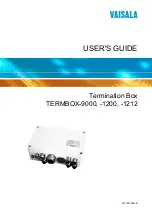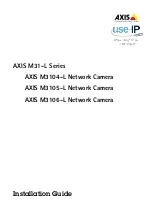
Connecting a Management Ethernet Cable
When using the Ethernet Management port in the default mode (speed-auto and duplex-auto) the port operates
in auto-MDI/MDI-X mode. The port automatically provides the correct signal connectivity through the
Auto-MDI/MDI-X feature. The port automatically senses a crossover or straight-through cable and adapts to
it.
However, when the Ethernet Management port is configured to a fixed speed (10 or 100 Mbps) through
command-line interface (CLI) commands, the port is forced to MDI mode.
When in a fixed-speed configuration and MDI mode:
• Use a crossover cable to connect to an MDI port
• Use a straight-through cable to connect to an MDI-X port
To comply with the Telcordia GR-1089 NEBS standard for electromagnetic compatibility and safety, connect
the Management Ethernet ports only to intra-building or unexposed wiring or cable. The intrabuilding cable
must be shielded and the shield must be grounded at both ends. The intra-building port(s) of the equipment
or subassembly must not be metallically connected to interfaces that connect to the OSP or its wiring. These
interfaces are designed for use as intra-building interfaces only (Type 2 or Type 4 ports as described in
GR-1089-CORE) and require isolation from the exposed OSP cabling. The addition of Primary Protectors is
not sufficient protection in order to connect these interfaces metallically to OSP wiring.
Warning
Installing and Removing SFP
The Cisco NCS 4216 supports a variety of SFP modules, including optical and Ethernet modules. For
information on how to install and remove SFP modules, see the documentation for the SFP module at
http://www.cisco.com/en/US/partner/products/hw/modules/ps5455/prod_installation_guides_list.html
For information about inspecting and cleaning fiber-optic connections, see
http://www.cisco.com/en/US/partner/tech/tk482/tk876/technologies_white_paper09186a0080254eba.shtml
We recommend that you wait 30 seconds between removal and insertion of an SFP on an interface module.
This time is recommended to allow the transceiver software to initialize and synchronize with the standby
RSP. Changing an SFP more quickly could result in transceiver initialization issues that disable the SFP.
Caution
Connecting a USB Flash Device
To connect a USB flash device to the Cisco NCS 4216, insert the memory stick in the USB port labeled MEM.
The Flash memory module can be inserted in only one way, and can be inserted or removed regardless of
whether the router is powered up or not.
The following figure shows the USB port connector on the Cisco NCS 4216.
Installing the Cisco NCS 4216
50
Installing the Cisco NCS 4216
Connecting a Management Ethernet Cable
















































